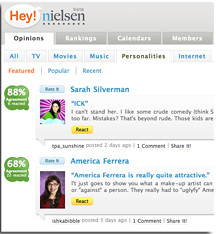My son says he is too old to remember, but there is one gift he asked for, year after year, and never received. He wanted it so much, he even tried to make one a few times: the handy-dandy Great Big Book Of Everything.
Not the one inspired by the kid's television show, Stanley, but a real one with everything in it. Every year, I ask him if he still wants it.
"Do you remember?"
"Sure Dad, but I'm too old to watch Stanley anymore."
"Really?" When did that happen?
"It's okay Dad," he laughed. "Besides, I thought your blog was The Great Big Book Of Everything."
"Funny. I guess you are growing up."
"Yep, I'm pretty old," he smiled. "So, can we play Heroscape now?"
"You bet. Just give me a minute ... I want to see if you're right."
Rich's Great Big Blog Of Everything
365 Dias, AgencyNext, Amuseline, Anyone Loves TV, Arabelle's AlleyHannah Azar, Tala Azar, Back Lot Projects, Darren Barefoot, Andy Beard, Better Business Blogging, BizHack, BizSolutionsPlus, BlogCatalog Blog, Blogging For Business, Blog Campaigning, Blog Contests On The Net, Blog Herald, BlogTalk Radio, Blogversity, Blog Village, Blogs We Luv, Brand Storming, A Bunch Of Words, Business Growth Power Pack, Business Live News, The Buzz Bin, Cardiogirl, Catepol, CBS Jericho Fan Central, Chessnoid, Cincom, John Cook’s Venture Blog, Greg Cooper, CompBlog, Communication Overtones, Common Sense PR, Conversation Agent, Copyblogger, The Crones Daily Groan, Cultural Learnings, CypherJFs Development Depot, Dada Media, dcr Blogs, Da Eveman, Behind The Scenes At Jewelry Tales, Debo Hobo Dot Com, Digital 4Front, Duck Tape Marketing, Durbin Media, Electronic Recruiting News, Eliteqz, Entreneurs, Jay Epoch, Find The Boots, Finding The Sweet Spot, Fubar, Ghost In The Machine, Amitai Givertz, Good To Know, Golden Practices, The Green Scene, History Survey, Shel Holtz, Home Office Lawyer, I Do Things, Image Empowering, idUnited, Inner88, Jdonuts, Gylon Jackson, Jaffe Juice, Jason the Content Librarian, The Jericho Bulletin, Jericho Central, Jericho Junction, Jericho Monster, Jericho On CBS, Jericho Rally Point, JR4OT Blog, KD Paine’s PR Measurement Blog, Trish Kate’s TV Talk, Keep It Simple Solutions, Alex King, Language For You, Living In The Edge Of Madness, Leadership Turn, Magnosticism, Marcom Writer Blog, Marketing Headhunter Marketing Useable, Marketing Whore, Phil McDonnell, Jeff McNeill, MediaBlog, Media Orchard, The Media Slut, Media Snackers, Mesmereyed, Miscellany from Past and Present, Andrea Morris, Movies And Film Blog, MS Language Services, My Radical Blogs, MyBlogLog, The Myles Files, Naruto’s Arena, National Business Community Blog, The Net-Savvy Executive, NoisyRoom, Now Is Gone, Nutsonline, O My Word!, Occam’s Razr, Oldephartteintraining, One Bee, Paris Hilton, Passion, People and Principles, The Perfect Customer Experience, Pet Lvr (The Blog), A Piece of Piece, Pierce Mattie Public Relations, Politics After 50, Positioning Strategy, PR 2.0, Ramblings From The Mermaid Tavern, PR Squared, Publicity Hound, Radio Caffeine, Raven’s Roads, Recruiting.com, Recruiting Animal, RecruitingBlogs RecruitingBloggers, Reddiggulo.us, Remote Access, Road Less Traveled, Ronin Marketeer, Rugjeff’s Blog, Rushda, Sabrina’s Money Matters, Save The Black Donnellys, Save Jericho Now, Save Veronica Mars, Sava Sakar, Scary Sh*t, Scatterbox, Selling To Small Businesses, Situtational Marketing, SEO Pedia, Six Degrees From Dave, Snupher, The Social Media Marketing Blog, Social Media Explorer, Space 150, Spin Thicket, SQ Central, Squeak Of The Week, Starlight Review, Strumpette, Liz Strauss, Jim Stroud, Jeffery Taylor, Teaching PR, Television Rocker Report, Tetsujin’s Blog, That Bee Girl, The Thin Red Line, This Girl’s Blog, Tough Sledding, Transmission, The TV Guy, Veronica Mars Movie, Andrea Vascellari Weblog, Web Conoscenza, Web Ink Now, Brian Whaley’s Pixelated Views, Word Sell, Writer’s Advice, Your PR Guy, Zero Calvin and Hobbes, and the The Zohner Family Blog.
Whether we agreed or agreed to disagree, thank you all for making 2007 interesting. Likewise for everyone who read and commented.
Sure, there are a couple more posts to round out 2007. But mostly I'm looking forward to a rewarding 2008, wondering who might make next year's Great Big Blog Of Everything, and making sure the lethal Marro hive is stopped from making more venomous predators in some uncharted jungle!
You have to enjoy this stuff before you're "pretty old" for it.

Not the one inspired by the kid's television show, Stanley, but a real one with everything in it. Every year, I ask him if he still wants it.
"Do you remember?"
"Sure Dad, but I'm too old to watch Stanley anymore."
"Really?" When did that happen?
"It's okay Dad," he laughed. "Besides, I thought your blog was The Great Big Book Of Everything."
"Funny. I guess you are growing up."
"Yep, I'm pretty old," he smiled. "So, can we play Heroscape now?"
"You bet. Just give me a minute ... I want to see if you're right."
Rich's Great Big Blog Of Everything
365 Dias, AgencyNext, Amuseline, Anyone Loves TV, Arabelle's AlleyHannah Azar, Tala Azar, Back Lot Projects, Darren Barefoot, Andy Beard, Better Business Blogging, BizHack, BizSolutionsPlus, BlogCatalog Blog, Blogging For Business, Blog Campaigning, Blog Contests On The Net, Blog Herald, BlogTalk Radio, Blogversity, Blog Village, Blogs We Luv, Brand Storming, A Bunch Of Words, Business Growth Power Pack, Business Live News, The Buzz Bin, Cardiogirl, Catepol, CBS Jericho Fan Central, Chessnoid, Cincom, John Cook’s Venture Blog, Greg Cooper, CompBlog, Communication Overtones, Common Sense PR, Conversation Agent, Copyblogger, The Crones Daily Groan, Cultural Learnings, CypherJFs Development Depot, Dada Media, dcr Blogs, Da Eveman, Behind The Scenes At Jewelry Tales, Debo Hobo Dot Com, Digital 4Front, Duck Tape Marketing, Durbin Media, Electronic Recruiting News, Eliteqz, Entreneurs, Jay Epoch, Find The Boots, Finding The Sweet Spot, Fubar, Ghost In The Machine, Amitai Givertz, Good To Know, Golden Practices, The Green Scene, History Survey, Shel Holtz, Home Office Lawyer, I Do Things, Image Empowering, idUnited, Inner88, Jdonuts, Gylon Jackson, Jaffe Juice, Jason the Content Librarian, The Jericho Bulletin, Jericho Central, Jericho Junction, Jericho Monster, Jericho On CBS, Jericho Rally Point, JR4OT Blog, KD Paine’s PR Measurement Blog, Trish Kate’s TV Talk, Keep It Simple Solutions, Alex King, Language For You, Living In The Edge Of Madness, Leadership Turn, Magnosticism, Marcom Writer Blog, Marketing Headhunter Marketing Useable, Marketing Whore, Phil McDonnell, Jeff McNeill, MediaBlog, Media Orchard, The Media Slut, Media Snackers, Mesmereyed, Miscellany from Past and Present, Andrea Morris, Movies And Film Blog, MS Language Services, My Radical Blogs, MyBlogLog, The Myles Files, Naruto’s Arena, National Business Community Blog, The Net-Savvy Executive, NoisyRoom, Now Is Gone, Nutsonline, O My Word!, Occam’s Razr, Oldephartteintraining, One Bee, Paris Hilton, Passion, People and Principles, The Perfect Customer Experience, Pet Lvr (The Blog), A Piece of Piece, Pierce Mattie Public Relations, Politics After 50, Positioning Strategy, PR 2.0, Ramblings From The Mermaid Tavern, PR Squared, Publicity Hound, Radio Caffeine, Raven’s Roads, Recruiting.com, Recruiting Animal, RecruitingBlogs RecruitingBloggers, Reddiggulo.us, Remote Access, Road Less Traveled, Ronin Marketeer, Rugjeff’s Blog, Rushda, Sabrina’s Money Matters, Save The Black Donnellys, Save Jericho Now, Save Veronica Mars, Sava Sakar, Scary Sh*t, Scatterbox, Selling To Small Businesses, Situtational Marketing, SEO Pedia, Six Degrees From Dave, Snupher, The Social Media Marketing Blog, Social Media Explorer, Space 150, Spin Thicket, SQ Central, Squeak Of The Week, Starlight Review, Strumpette, Liz Strauss, Jim Stroud, Jeffery Taylor, Teaching PR, Television Rocker Report, Tetsujin’s Blog, That Bee Girl, The Thin Red Line, This Girl’s Blog, Tough Sledding, Transmission, The TV Guy, Veronica Mars Movie, Andrea Vascellari Weblog, Web Conoscenza, Web Ink Now, Brian Whaley’s Pixelated Views, Word Sell, Writer’s Advice, Your PR Guy, Zero Calvin and Hobbes, and the The Zohner Family Blog.
Whether we agreed or agreed to disagree, thank you all for making 2007 interesting. Likewise for everyone who read and commented.
Sure, there are a couple more posts to round out 2007. But mostly I'm looking forward to a rewarding 2008, wondering who might make next year's Great Big Blog Of Everything, and making sure the lethal Marro hive is stopped from making more venomous predators in some uncharted jungle!
You have to enjoy this stuff before you're "pretty old" for it.





































